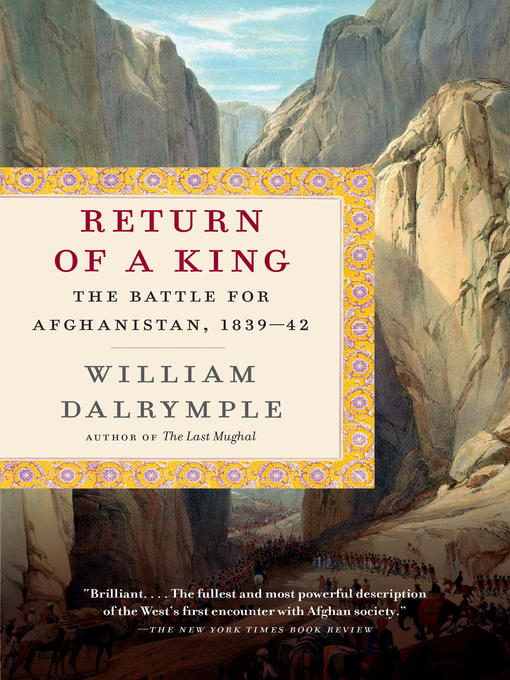
Return of a King
The Battle for Afghanistan, 1839-42
کتاب های مرتبط
- اطلاعات
- نقد و بررسی
- دیدگاه کاربران
نقد و بررسی

Starred review from June 1, 2013
An intensively focused study of the ill-begotten launch of the Great Game in Afghanistan. Who would gain control of the portal to India: Britain, France, Russia, the Sikhs or the Afghan tribes themselves? And was there really cause for alarm at imperialist advances or a "dysfunctional" intelligence gathering by both the British and Russians? In his exciting, exhaustive study, British historian Dalrymple (The Last Mughal: The Fall of a Dynasty: Delhi, 1857, 2007, etc.) sheds light on the enormously convoluted rationale for the First Anglo-Afghan War, ostensibly provoked by Britain in order to reinstall the compliant Shah Shuja ul Mulk (chief of the Sadozai clan) to power in Afghanistan over Dost Mohammad Khan (chief of the Barakzais), who supposedly favored the Russians. In truth, the war exposed the greediness and ignorance of all sides: protecting the interests of the East India Company and catering to the competing ambitions of major players like Sikh ruler Ranjit Singh, Polish agent Ivan Vitkevitch, William Hay Macnaghten and Scottish agent Alexander Burnes. The British garrison was soon outnumbered 10-1 by the rebel forces of Akbar Khan, Dost Mohammad's able, ferocious son; forced to surrender and retreat in ignominy back to India, the British left Shuja to fall to Dost's assassins in April 1842 and gained virtually nothing save a more defined border. Dalrymple sagely points out that while the Afghans learned a valuable lesson from this early conflict, namely a firm rejection of foreign rule and a sense of nationalist integrity, the Western powers did not and, indeed, still perpetuate a policy of folly and waste. A rich excavation of both British and Afghan sources, with gorgeous colored reproductions of Muslim and romantic renderings of the action and characters.
COPYRIGHT(2013) Kirkus Reviews, ALL RIGHTS RESERVED.

November 1, 2012
We've been fighting in Afghanistan for 11 years, with no end in sight, and we hear increasingly that we ought to have paid more attention to the West's history of blundering in that country (not to mention the recent disastrous Soviet experience) before blundering in ourselves. For perspective, it pays to go back to the first Afghan War, a great imperial debacle for the British, and Dalrymple--winner of two major history prizes in Britain, the Wolfson and the Duff Cooper, and a best-selling author as well--obliges us with this chronicle.
Copyright 2012 Library Journal, LLC Used with permission.

Starred review from April 1, 2013
The British humiliation in the so-called First Anglo-Afghan War (183942) has long been viewed by historians as a classic example of imperial overreach. Still, it is a saga that makes for marvelous storytelling, filled with heroes, knaves, incompetent fools, and savage, bloodthirsty warriors. It has been told often before but perhaps never so well as by Dalrymple, a historian and travel writer. He places British intervention within the context of the Great Game rivalry with the Russian Empire over influence in central Asia. When the British favorite in Afghanistan, Shah Shuja, was driven into exile, British officials in India feared enhanced Russian influence there and decided to reinstall him at the point of a gun. What followed was a mixture of farce, tragedy, and horror. The British army occupying Kabul was surrounded by a hostile and harrying population. When forced to retreat back to India through unforgiving terrain, thousands of soldiers and camp followers died from cold, hunger, or constant attacks by merciless mounted Afghans. Dalrymple doesn't shrink from drawing the obvious parallel with the current American intervention. That may, or may not, be facile, but this is an absorbing and beautifully written account of a doomed effort to control an apparently uncontrollable population.(Reprinted with permission of Booklist, copyright 2013, American Library Association.)

























دیدگاه کاربران